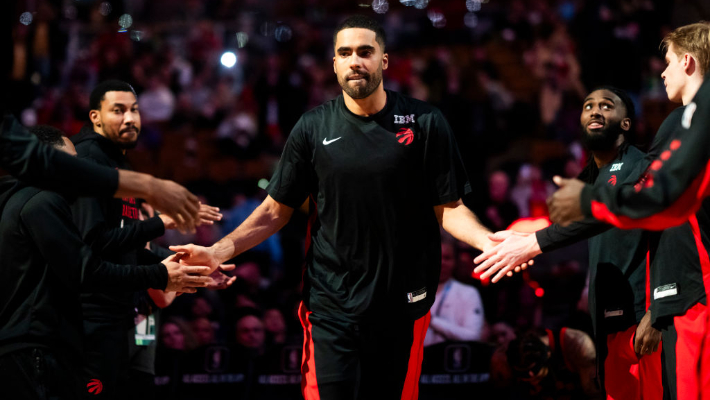Gambling
Four Takeaways From Jontay Porter’s Lifetime Ban For Gambling

After moving through the early years of legalized sports betting relatively unscathed from controversy, the NBA had its first big betting scandal arrive late in March courtesy of Jontay Porter.
Some questionable prop betting activity on Porter in two games in which he removed himself with an injury or illness raised red flags and launched an NBA investigation that ultimately resulted in Porter being given a lifetime ban from the league. The NBA found Porter knowingly gave bettors information regarding his health status and then made sure he played in the games to ensure his prop bets went active before pulling himself out early to ensure the unders those bettors wagered on hit. The league also found he bet on 13 NBA games, winning over $21,000, while a member of the Raptors G League affiliate, including at least one bet on the Raptors to lose (in a parlay which lost).
That all, unsurprisingly, resulted in a lifetime ban for Porter, but there are plenty of takeaways and lessons to be learned by the league, players, fans, and media from this saga.
1. An $80,000 Prop Bet Parlay On A Bench Player Will Raise Some Eyebrows
There’s a lot to get to with this story, but I have to start with the thing my brain just can’t get past, which is that these idiots really thought they’d get away with an $80,000 prop bet parlay on Jontay Porter to win $1.1 million without the sportsbooks going, “Hey, wait a minute.” Charles Barkley once offered the sage advice of “America, do not commit crimes with checks,” and we might need him to refresh that for the Jontay Porter situation. Every time we get any kind of athlete betting story — whether it be Calvin Ridley betting NFL games or the Alabama baseball coach relaying info on a pitcher to a friend in Ohio — they all seem to miss the fact that when you log onto an online sportsbook or go to a physical book, just like walking into one of Terry Benedict’s hotel, someone is always watching.
They won’t stop you in the immediate, but they’ll happily flag the action and send it to the proper authorities or league to deal with. You might get away with small wagers, but as soon as you start putting up big sums on games or props that otherwise don’t attract much action, you have just set off an alarm somewhere.
2. This Is Why Leagues Like Legal Sports Betting
While there are absolutely problems with people having immediate, 24/7 access to sports betting on their phones and the addictive quality of sports betting, the leagues love it because it’s regulated and because legal books flag this kind of action. Unregulated bookies aren’t going to call up the league and tell them there’s something questionable going on, because, well, their entire operation is questionable. A great example of this is what baseball is going through right now with Shohei Ohtani’s interpreter, Ippei Mizuhara, and how that only came to light due to a federal investigation into that illegal bookmaking enterprise. The leagues have certainly enjoyed the financial benefits of sportsbooks wanting to be league partners, but they also enjoy having a relationship with the books to allow them to be aware quickly of this sort of activity (and have records).
There are conversations to be had about legal sports betting, how sportsbooks can be predatory, and the problems that can arise from giving people easy access to betting on their phones. But in terms of the integrity of the sports themselves, legal betting is a huge help in curbing match fixing and game manipulation because everything gets tracked and the systems in place allow for investigations like this to happen. The spike in gambling controversies and legal betting do go hand-in-hand to an extent, but a big part of that is it’s now much easier to track and much harder to hide shaky behavior if done at a legal book. So, while I have laughed at jokes about this being a topic of discussion on NBA shows sponsored by DraftKings and FanDuel, this scenario (plus, yes, the money) is exactly why the league wants those places as partners.
3. Would They Have Done This If A Superstar Was Involved?
Some have wondered if the league would handle this the same way if one of their superstars faced similar allegations. The truth is, it’s far less likely that situation would arise, as those players have far less incentive to participate in something like this by virtue of making hundreds of millions of dollars. But of course, gambling addiction can reach anyone, so it’s totally possible that could happen.
I think the answer is yes, particularly if the facts were as clear as they were in this case. If they had documentation of conversations with bettors to manipulate an outcome and a paper trail of bets made on basketball, I really believe a lifetime ban would arrive all the same no matter the caliber of player. Perhaps I am naive, but also the NBA has just set that as precedent, meaning it’d be far more difficult for them to go in a different direction if and when this happens again — integrity of the game is the single most important thing in the eyes of the league, and even if LeBron James or Steph Curry jeopardizes that, it’s a gigantic problem.
All that said, I have little doubt that the league office was fairly relieved to learn the first real betting scandal they needed to handle involved a player of Jontay Porter’s caliber. That saved some sleepless nights over coming to the realization they’d have to ban a star, and instead they were able to set a precedent and use a bench player on a two-way deal as an example of what will happen if you do this, without losing someone from the league that is particularly notable.
4. Will This Deter Others?
While we won’t know for sure, the answer is “to a degree.” Players should learn that it’s not easy to outsmart the books in these kinds of schemes. If it seems too easy to make a quick $1.1 million by throwing a prop bet parlay, then it probably is. I think most players will realize that the money made from a scheme to throw bets is not enough to replace the salary they’ll make over a career, particularly guys that are firmly in the league — which, again, is why I don’t expect anything like this to happen with a star caliber guy.
However, there’s almost always someone who thinks they have a plan that is foolproof. I expect at some point down the line someone will get talked into another scheme and throw away a basketball career for a quick payday. I doubt that is a prominent player, but eventually someone will think they’ve cracked the code and learn the lesson Porter did.








